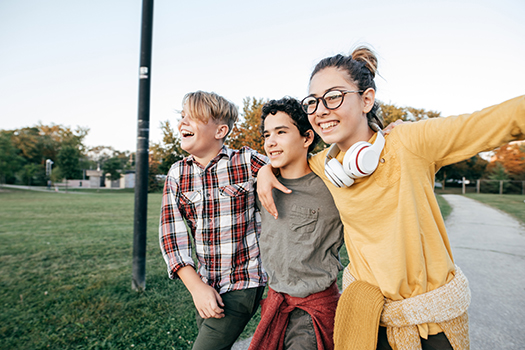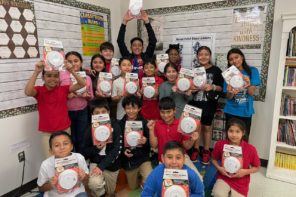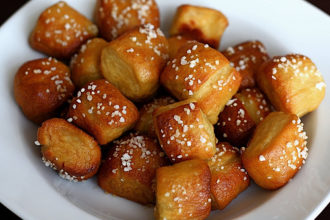Having a group of friends can be a big part of most kids’ feelings of well-being, belonging and self-esteem. Being part of a peer group can affect everything from students’ grades to their emotional health. But the ability to make good friends—and be a good friend to others—has to be taught and nurtured just like any other skill. It is important to understand how we help our children not only make friends, but develop strong, supportive relationships based on mutual respect, kindness and inclusion.
Here are four things you can do to help your kids make true friends:
1. Help them develop their life skills.
Being able to recognize and calmly express their emotions or respond to a friend’s feelings with empathy are powerful life skills that children can start to learn at a very young age. Tools like the social-emotional-learning podcast, The Imagine Neighborhood, use silly stories to introduce children (ages 4-10) to challenging social situations in a safe and entertaining way.
Talking to your child about the questions raised by these kinds of stories is a great opportunity to build their emotional awareness and help them develop effective problem- solving skills.
2. Help them learn to be the kind of friend they’d like to have.
In a landmark study, child development researchers made the surprising discovery that many popular children did not have close, primary friendships with any of their peers. A child can be admired by his classmates, but that child may also be considered bossy, or make other children feel unsafe.
What kids look for in pursuing close relationships is a combination of how that person makes them feel about themselves, how much fun they have with the new person and whether or not they can trust them. Helping even the most popular kid learn to focus on “playing fair,” making connections and treating others with kindness and respect will help them build healthy relationship skills for the future.
3. Encourage and support diverse friend circles.
It’s common for young people to be hesitant about the unknown, so your child may inadvertently shy away from classmates with different backgrounds or even behave unkindly towards them. Having deep friendships with people from other cultures is associated with better social skills, more empathy and less bias, but these relationships are still uncommon, especially in white families.
Seeing the grown-ups in their lives interact with friends from other backgrounds makes a big difference, and you can also introduce children to cultures outside their own through stories, books and media. The “Imagine Neighborhood” podcast is a good option, as it offers episodes specifically addressing inclusion and making friends across a range of identities (Food Fight, Blizzards and Wizards, Anyone Can Play).
4. Be an example they can aspire to.
Although it can feel like kids don’t pay attention to their grown-ups, every parent knows that, in fact, children are constantly absorbing everything that happens around them. So, although it’s important to talk to young people about having kind, respectful friendships, exercising your own good relationship skills around them is just as impactful.
Every interaction you have is an opportunity to model positive relationships based on kindness and respect—from how you connect with your friends and how you manage your family’s play date guests, to how you interact with everyone from a checkout clerk to a crossing guard.
Best of all, even the mistakes you might make can spark conversations with your kids about the challenges that friendships present for all of us, and let you share your own strategies for making things right.
Not all early friendships are destined to continue past our school years, but the lessons we learn from them can resonate throughout our lives. By nurturing the social-emotional skills that help kids understand both themselves and others, you can play an active role in setting up your child for better friendship outcomes this year and for all their years to come.
Jodi Kingsley is a Chicago-based freelance writer who prides herself on being the cool auntie for her many nieces and nephews.





